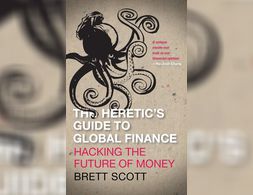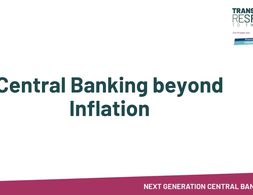✕
309 results
The effects of the 2020 pandemic on the Latin-American region: a thorough before-after analysis.
In the pluralist showcase series by Rethinking Economics, Cahal Moran explores non-mainstream ideas in economics and how they are useful for explaining, understanding and predicting things in economics.
In his 2010 published book “The Enigma of Capital and the Crises of Capitalism” multi-talented US geographer, anthropologist and Marxist economist David Harvey aims to analyse the capitalist system that has shaped western society and the globalized world of today.
Popular anger against the financial system has never been higher, yet the practical workings of the system remain opaque to many people. The Heretic's Guide to Global Finance aims to bridge the gap between protest slogans and practical proposals for reform.
The 2007–08 credit crisis and the long recession that followed brutally exposed the economic and social costs of financialization. Understanding what lay behind these events, the rise of “fictitious capital” and its opaque logic, is crucial to grasping the social and political conditions under which we live. Yet, for most people, the operations of the financial system remain shrouded in mystery.
"The Company of Strangers: A Natural History of Economic Life" by Paul Seabright is an engaging and informative book that explores the complex relationship between economic behavior and human instincts. Seabright uses real-world examples to present complex ideas in a clear and accessible way. The author argues that the market is not only a place for exchanging goods and services but also relies on trust, cooperation, and social norms.
This article explores if power dynamics in the household can be changed, and if so, how. In this context the focus is laid on government childcare policy and its various channels of possible influence.
This article, looks at the complex interaction between an urban economy and the vegetation within that urban area. In summary, numerous studies have found a positive link between increased vegetation and social as well as personal health. It makes a case for increasing urban vegetation as a way to benefit local economies.
Feminist economics is a key component of the movement for pluralism in economics and one that has, to some extent, been acknowledged by the mainstream of the profession. It seeks to highlight issues which affect women because (it claims) they have not traditionally been recognised in a field dominated by men. On top of this, it seeks to carve out a space for women in the discipline, both for intrinsic reasons of fairness and diversity and because it means that women’s issues are more likely to be highlighted going forward.
Though apparently siblings from the same family, New Keynesianism and Post-Keynesianism are completely different schools of economic thought. As to why and in what regard exactly, that is what this book is all about. While the former is the official label of the current mainstream in economic research and teaching (rather than neoclassic economics, which would be more apt a term), the latter tries to preserve the original thinking of John Maynard Keynes, but also additional ideas and concepts of all those building on his work.
Modern Monetary Theory and Practice: An Introductory Text is an introductory textbook for university-level macroeconomics students. It is based on the principles of Modern Monetary Theory (MMT).
Modern Monetary Theory and the Birth of the People s Economy The leading thinker and most visible public advocate of modern monetary theory the freshest and most important idea about economics in decades delivers a radically different bold new understanding for how to build a just and prosperous society Stephanie …
A Heterodox Approach to Economic Analysis This important new book introduces students to the fundamental ideas of heterodox economics presented in a clear and accessible way by top heterodox scholars It offers not only a critique of the dominant approach to economics but also a positive and constructive alternative Students …
This guide contains a collection of recommended YouTube channels and YouTube videos in the fields of economics, business and economic policy.
In 18th century Europe figures such as Adam Smith, David Ricardo, Friedrich List and Jean Baptiste Colbert developed theories regarding international trade, which either embraced free trade seeing it as a positive sum game or recommended more cautious and strategic approaches to trade seeing it as a potential danger and a rivalry and often as a zero-sum game. What about today?
This chapter discusses the role of gender in economic relations, processes, and outcomes. Gender differences in economic outcomes such as labor force participation and wages have received growing attention from economists in the last several decades – a positive and much needed development in economic thinking.
As seen with the United Nations significant promotion of the Sustainable Development Goals (SDGs) in the past few years, the issue of global development is of growing concern to many international organizations. As humanity continues to become more interconnected through globalization, the inequalities and injustices experienced by inhabitants of impacted countries becomes increasingly clear. While this issue can be observed in the papers of different types (e.g., different schools of thought) of economists throughout the world, the work of behavioral and complexity economists offer a unique, collaborative perspective on how to frame decisions for individuals in a way that can positively reverberate throughout society and throughout time.
MERCOSUR (Mercado Común del Sur or Common Southern Market) was the first formalized attempt to integrate South American countries economically and politically.
An essay of the writing workshop on contemporary issues in the field of Nigerian economics: Labour and all the dynamics, such as laws, mobility, gender participation, regulation etc., that are associated with it cements the need for this paper which seeks to objectively review, analyse, and if deemed necessary, give plausible recommendations.
Firms are the primary places where economic activity takes place in modern capitalist economies: they are where most stuff is produced; where many of us spend 40 hours a week; and where big decisions are made about how to allocate resources. Establishing how they work is hugely important because it helps us to understand patterns of production and consumption, including how firms will react to changes in economic conditions and policy. And a well-established literature – led by post-Keynesians and institutionalists – holds that the best way to determine how firms work is to…wait for it...ask firms how they work. This a clearly sensible proposition that is contested in economics for some reason, but we’ll ignore the controversy here and just explore the theory that springs from this approach.
How countries achieve long-term GDP growth is up there with the most important topics in economics. As Nobel Laureate Robert Lucas put it “the consequences for human welfare involved in questions like these are simply staggering: once one starts to think about them, it is hard to think about anything else.” Ricardo Hausmann et al take a refreshing approach to this question in their Atlas of Economic Complexity. They argue a country’s growth depends on the complexity of its economy: it must have a diverse economy which produces a wide variety of products, including ones that cannot be produced much elsewhere. The Atlas goes into detail on exactly what complexity means, how it fits the data, and what this implies for development. Below I will offer a summary of their arguments, including some cool data visualisations.
Economic sociology is an entire subfield and one could write an series on it, so I’m going to stick to probably the most prominent economic sociologist and the founder of ‘new economic sociology’, Mark Granovetter.
Exploring Economics, an open-access e-learning platform, giving you the opportunity to discover & study a variety of economic theories, topics, and methods.
After completing the module, participants should be able to have general overview on the theory of commons. They can differentiate between neoclassical, new institutional and social/critical commons theory and can use these theories to assess real life common-pool resource management and commoning pratices.
Use economic models to learn how prices and markets benefit society in the face of scarcity and then apply those models to analyze policy Jonathan Gruber edX Massachusetts Institute of Technology
Shadow banking became one of the main features of modern market based financial capitalism and financial globalisation. Daniel Gabor locates this development in a Super-Cycle framework and sketches out opportunities to launch a new cycle that is green and just through financial regulation and publicly organised sustainable finance.
In this lecture, Branko Milanovic gives an overview of the concept of inequality as conceptualized within the classical school of thought.
This article considers the strengths of agent-based modelling and the ways that it can be used to help central banks understand the economy. These models provide a complement to more traditional economic modelling which has been criticised in the wake of the Great Recession.
Recording of the Workshop “The collateral supply effect on central banking”, 04.02.2021, part of the "Next Generation Central Banking - Climate Change, Inequality, Financial Instability" conference by the Heinrich-Böll-Stiftung
This panel was part of the conference "Next Generation Gentral Banking - Climate Change, Inequality, Financial Instability" 03. - 05.02.2021.
This panel was part of the conference "Next Generation Gentral Banking - Climate Change, Inequality, Financial Instability" 03. - 05.02.2021.
Exploring Economics, an open-access e-learning platform, giving you the opportunity to discover & study a variety of economic theories, topics, and methods.
We use cookies on our website. Click on Accept to help us to make Exploring Economics constantly better!






























